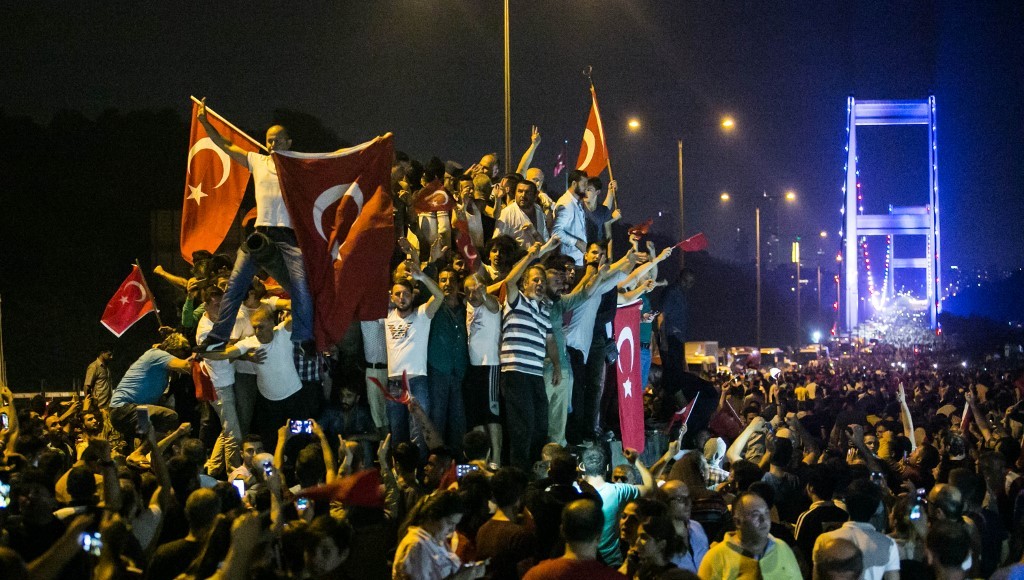Five years ago, on the night of July 15, renegade Turkish soldiers tried to topple President Recep Tayyip Erdoğan, using combat planes and tanks to attack government buildings.
The coup failed when loyal troops intervened, and thousands responded to Erdoğan’s television appeal to take to the streets in his support.
The attempted putsch officially left some 250 people dead, apart from the plotters, and more than 2,000 injured.
Troops on the streets
At around 11 pm on July 15, Turkish premier Binali Yıldırım denounces an attempt to overthrow the government after bridges over the Bosporus Strait are partially blocked by soldiers in İstanbul, Turkey’s biggest city.
Just before midnight, a military group calling itself the “Council for Peace in the Homeland” declares martial law and a curfew as soldiers take to the streets of the capital Ankara as well as İstanbul.
The military says “the power in the country has been seized in its entirety.”
Fighter jets screech low overhead in Ankara followed by helicopters. In İstanbul, the main roads, especially those leading to the emblematic Taksim Square, are cut off by the security forces.
Erdoğan calls on Turks
From Marmaris, western Turkey, where Erdoğan is on holiday, he calls on the population to oppose the “coup”, speaking via a cellphone link broadcast on television.
He denounces an uprising by a minority within the army. “I certainly believe that coup plotters will not succeed,” he says, promising they will pay a “very heavy price.”
US President Barack Obama urges Turks to support their “democratically elected government”.
Jets battle tanks
Fighting in Ankara and İstanbul reaches a level not seen in decades, including the use of combat jets and tanks. Rebels clash with loyalist troops and the tens of thousands of civilians who have come out in support of the government.
Planes fly over Ankara and fire at strategic targets including the parliament, around which tanks have been deployed, and police headquarters.
In İstanbul soldiers open fire on the crowd.
Tens of thousands of people with Turkish flags face off against the rebel forces and climb on top of tanks.
Explosions and sporadic gunfire are heard in the early morning of July 16 in the center of Ankara and in İstanbul.
A combat plane drops a bomb near the presidential palace and F-16 fighter jets bombard rebel tanks stationed around the building.
Gülen accused
Erdoğan flies back to İstanbul’s Atatürk airport where a large crowd awaits. He declares that the coup plotters are guilty of “treason.”
He accuses the rebels of ties to his arch-enemy Fethullah Gülen, a US-based cleric whose Hizmet movement has a powerful presence in Turkish society, including the media, police and judiciary.
Gülen, however, condemns the coup “in the strongest terms.”
Erdoğan says the hotel in which he was staying in Marmaris was bombarded after his departure.
He praises Turks for having come out onto the streets in their “millions”, notably on Taksim Square in İstanbul.
The prime minister orders the army to shoot down planes and helicopters in rebel hands.
Rebels surrender
Numerous top military officials publicly distance themselves from the coup.
Dozens of rebel soldiers begin to surrender to security forces on the Bosporus bridge where the rebels had earlier fired at civilians.
At midday on July 16 the government declares that the attempted putsch has been defeated. “The situation is completely under control,” Yıldırım says.
But Erdoğan urges Turks via Twitter to remain in the streets to prevent a possible “flare-up” of chaos.
In the evening, thousands of jubilant Turks, especially in İstanbul and Ankara, celebrate the failure of the coup, honking car horns and waving Turkey’s red flag.
Erdoğan calls on Washington to extradite Gülen
Immediately after the failed putsch the authorities launch a vast dragnet across Turkey. Since then tens of thousands of people have been arrested.
AFP

